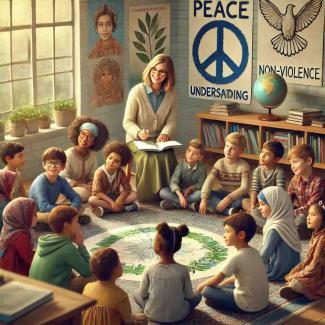Peace Education: Imbibing Culture of Peace in Young Mind
In recent times, war and violence have emerged on an unprecedented scale and engulfed societies across the globe. Its various manifestations in the forms of terrorism, war, ethnic conflict, crime, and domestic violence have considerably affected human society. The younger generation, particularly the children, are the worst sufferers of such mindless bloodletting. The armed conflicts in Africa, Afghanistan and Iraq have left thousands killed, maimed, orphaned, displaced from homes, separated from their families, and deprived of their basic right of education. Conflicts or violence not only bring about enormous damage in the lives of children but also leave an indelible imprint in their young minds for a long time. As children are considered the storehouse of innocence, it is imperative to catch them young and nurture peace in their hearts and minds.
Grac’a Machel in her report (Impact of Armed Conflict on Children, UNICEF, 2002) has noted that the proportion of war victims who are civilians has moved in recent decades from 5 per cent to over 90 per cent and at least half of these are children. According to a survey by the United Nations, 97 per cent of Afghan children aged less than 16 years have witnessed violence, and 65 per cent have experienced the death of relatives. Who will forget the horrifying visuals of half-naked children running for their lives during the hostage crisis at Beslan in Russia? There were at least 335 fatalities during the ensuing crossfire, mostly children. Almost 700 have been hospitalized with grievous physical and psychological injuries. More recently, on September 30, nearly 50 people died and more than 200 wounded, the vast majority of them children, as three car bombs went off near a US military convoy in Baghdad. These gory events not only have a negative impact on those who survived the ordeal but also on those who have witnessed the horror.
The impact is unfathomable and has a long-term effect. Since wars begin in the minds of men, it is in the minds of men that the defence of peace must be constructed. What we exactly need is detoxification of the mind through peace education. Such an education involves spiritual development and the enhancement of the value system. It can be defined as the educational response to the problem of human violence. It is ‘directed to the full development of the human personality and the strengthening of respect for human rights and fundamental freedoms.’ It promotes ‘understanding, tolerance and friendship among all nations, racial or religious groups' (Article 26 of the Universal Declaration of Human Rights). Originally aimed at eliminating the possibility of global extinction through nuclear war, peace education currently addresses the broader objective of building and sustaining a culture of peace. Primarily focused on giving shape and structure to children's lives by instilling community values.
A comprehensive education and training system is needed for all groups of people at all levels and forms, both formal and non-formal. The primary objective is to develop a holistic approach based on participatory methods and consider the various dimensions of education for a culture of peace. To start at our level, we might find ourselves practising or preaching peace education without realizing the fact. Although in some form or other, it does exist in the prevalent school curricula. It has not been given the required attention it should have been given. The main thrust of education so far has been chiefly narrowed down to subject matters only relevant to passing an examination. The gap still lies large between theory and practice. Peace education could be taken up at various levels, such as local, regional, national, and international, as the ultimate purpose is to produce a conscious global citizen.
Mahatma Gandhi had once observed that ‘If we have to preach real peace in this world and carry on real war against war, we shall have to begin with children.’ In Gandhi’s words, education is the development of the mind, body, and soul. Even Fran Schmidt and Alice Friedman have said peacebuilding is the task of every human being and the challenge of the human family.
We, in our capability, could make the beginning for a more significant cause of peace and non-violence. The global movement started with the UN declaring the period from 2001-2010 as the International decade for a culture of peace and non-violence for the world's children. This period could be utilized in doing some ground works, which could be instrumental in making the world a better place to live in, at least for future generations.
